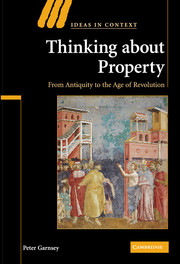Book contents
- Frontmatter
- Contents
- Abbreviations
- Preface
- Introduction
- Chapter 1 Plato's ‘communism’, Aristotle's critique and Proclus' response
- Chapter 2 Plato's ‘communism’: from late antiquity via Islamic Spain to the Renaissance
- Chapter 3 Renunciation and communality: thinking through the primitive Church
- Chapter 4 The poverty of Christ: crises of asceticism from the Pelagians to the Franciscans
- Chapter 5 The state of nature and the origin of private property: Hesiod to William of Ockham
- Chapter 6 The state of nature and the origin of private property: Grotius to Hegel
- Chapter 7 Property as a legal right
- Chapter 8 Property as a human right
- Conclusion
- Bibliography
- Index
Chapter 2 - Plato's ‘communism’: from late antiquity via Islamic Spain to the Renaissance
Published online by Cambridge University Press: 22 September 2009
- Frontmatter
- Contents
- Abbreviations
- Preface
- Introduction
- Chapter 1 Plato's ‘communism’, Aristotle's critique and Proclus' response
- Chapter 2 Plato's ‘communism’: from late antiquity via Islamic Spain to the Renaissance
- Chapter 3 Renunciation and communality: thinking through the primitive Church
- Chapter 4 The poverty of Christ: crises of asceticism from the Pelagians to the Franciscans
- Chapter 5 The state of nature and the origin of private property: Hesiod to William of Ockham
- Chapter 6 The state of nature and the origin of private property: Grotius to Hegel
- Chapter 7 Property as a legal right
- Chapter 8 Property as a human right
- Conclusion
- Bibliography
- Index
Summary
PRELIMINARIES
‘When I roll out the whole of this text of Plato's (or of Socrates’) Republic which I have in my hands, I know very well that I won't find those words.' The speaker is Pier Candido Decembrio, and the work Dialogues against Lactantius, written c.1443 by the Franciscan Antonio da Rho (Antonius Raudensis). Da Rho is putting forward Decembrio, in real life his friend and collaborator, as the defender of Plato against the early fourth-century Christian apologist Lactantius. The work as a whole belongs in the context of the contemporary debate between advocates of Plato and advocates of Aristotle. What Decembrio knew he would be unable to find, as he ‘scrolled down’ the Republic, was any statement to the effect that in Plato's ideal polity resources should be in common among the citizens. It just isn't there, said Decembrio. He was quite right. Platonic communality was for the Guards and Auxiliaries alone. It was Aristotle who first, for his own purposes, blandly stated that Plato's arrangements embraced the whole citizenry; and the late antique Neoplatonists told the same story, again, for their own purposes.
I'll come back in due course to Decembrio and the wider debate. For the present, let us note that it was unusual to charge Aristotle with misreading the text of Plato, with being, in effect, a bad historian of philosophy. More generally, it was unusual to apply source criticism to a text.
- Type
- Chapter
- Information
- Thinking about PropertyFrom Antiquity to the Age of Revolution, pp. 31 - 58Publisher: Cambridge University PressPrint publication year: 2007



